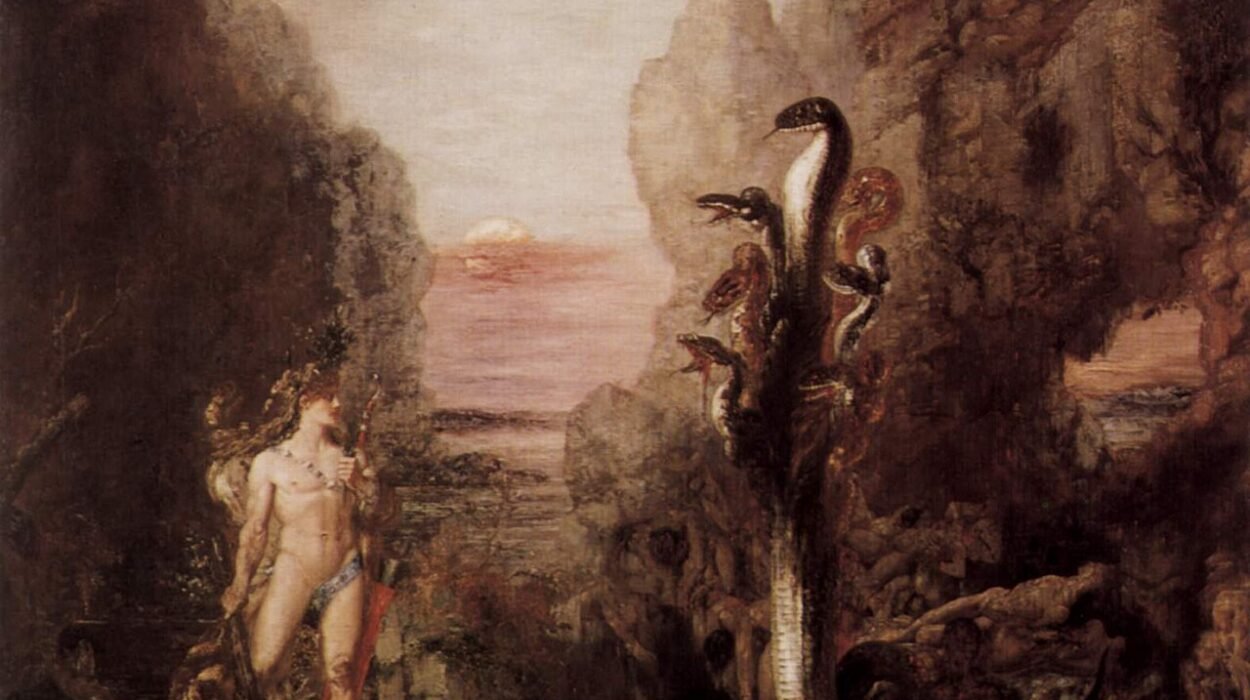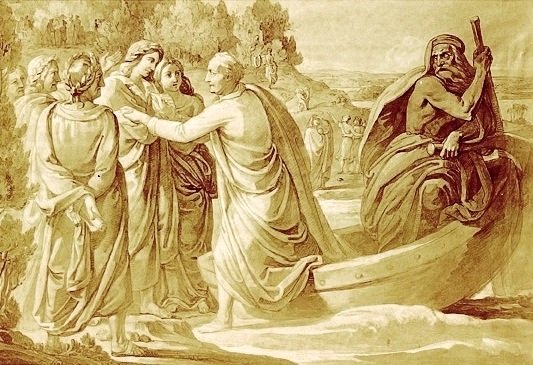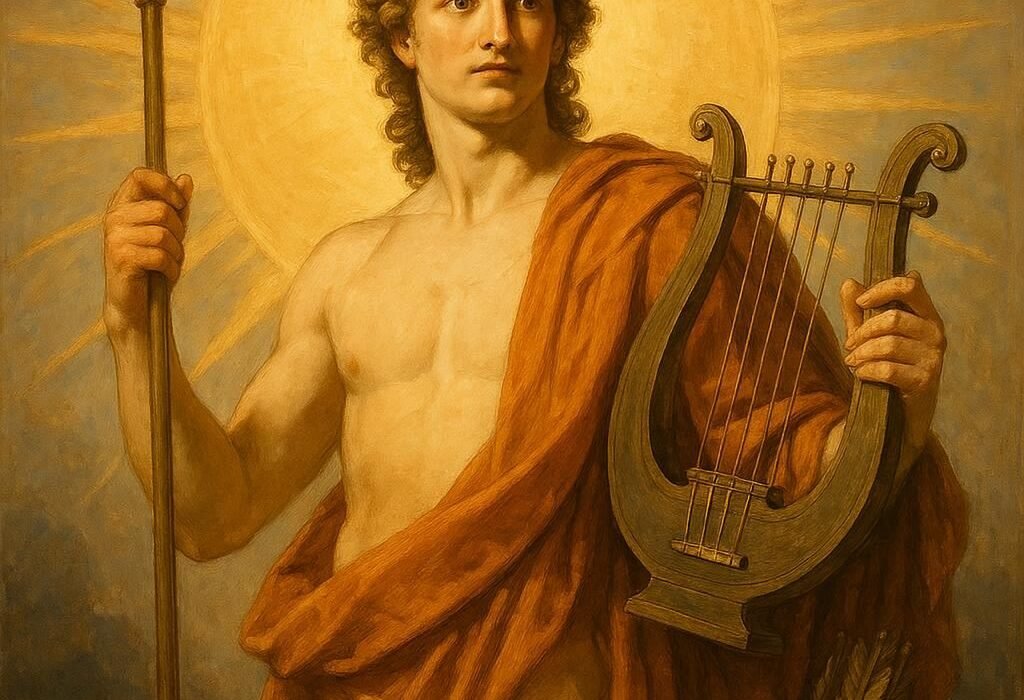In the ancient myths of Greece, there exists a figure both awe-inspiring and horrifying, a being who ruled the cosmos with an iron grip yet trembled at the whisper of destiny. That figure is Cronus, the youngest of the first Titans and father to the Olympian gods. To hear his story is to glimpse into the Greek imagination of power, fear, and fate—a tale where love and terror intertwine, and where the hunger for survival turns a father into a devourer of his own children.
Cronus is more than a mythic character. He is a symbol of the anxieties of kingship, the fear of succession, and the inevitability of change. His story is not only about monstrous acts but about the cycles of time itself, for Cronus embodies not just the Titan ruler but also the personification of Time’s relentless march, devouring everything it creates. To understand him is to understand one of the darkest and most profound myths of human culture.
The Birth of a Titan
Cronus was born from the primordial union of Uranus (Sky) and Gaia (Earth). Together, they birthed the first race of deities—the Titans, immense beings of unfathomable strength who represented the forces of nature and existence. But Cronus was not like his siblings. He was clever, ambitious, and cunning, traits that made him both dangerous and destined.
His childhood was shaped by violence. Uranus, his father, despised many of his children, especially the monstrous Hecatoncheires (Hundred-Handed Ones) and the Cyclopes, and imprisoned them deep within Gaia’s womb. Gaia, in agony and rage, sought vengeance against her tyrant husband. She fashioned a great sickle of adamant and begged her children to rise against their father. All hesitated—except Cronus.
With the sickle in hand, Cronus lay in wait. When Uranus came to embrace Gaia, Cronus struck. He castrated his father, casting the severed genitals into the sea, from which Aphrodite would one day be born. With this act, Cronus freed his siblings and seized supreme power. He became the ruler of the cosmos, the king of the Titans, and the one who toppled the Sky itself.
Yet the seeds of his own downfall had already been sown.
A Kingdom Built on Fear
As ruler, Cronus reigned over the Golden Age, a time described by poets like Hesiod as an era of peace, abundance, and harmony. Humans, who were yet young and fragile, lived without toil or suffering. The earth gave freely of its bounty, and no wars marred existence. To mortals, Cronus was not a tyrant but a benevolent figure, a god under whom life was easier than ever again.
But the peace of the Golden Age was a mask hiding Cronus’s paranoia. For just as he had overthrown his father, so too was he destined to be overthrown by one of his own children. Uranus and Gaia had spoken a prophecy that filled him with dread: one day, a child of Cronus would rise against him and strip him of power.
Cronus could not ignore this fate. Terrified of his children, he devised a plan both ruthless and unthinkable.
The Horror of a Father’s Feast
When Cronus married his sister, the Titaness Rhea, she bore him child after child. But Cronus, consumed by fear of the prophecy, refused to let them live. One by one, as each infant was born, he swallowed them whole.
Hestia, the goddess of the hearth, was the first to vanish into the Titan’s cavernous belly. Then Demeter, goddess of the harvest. Hera, goddess of marriage, followed, along with Hades, lord of the underworld, and Poseidon, lord of the sea. One by one, the children who would become the Olympian gods were devoured, imprisoned within their father’s body.
Rhea was stricken with grief. Each time she gave birth, her joy was stolen in an instant, swallowed by her husband’s unrelenting fear. She mourned not only as a mother but as a goddess, robbed of her children and her role as nurturer. The myth lingers in the human imagination because it captures a primal horror—the betrayal of parenthood, the reversal of nature, where the protector becomes the destroyer.
The Birth of Zeus and the Deception of Rhea
When Rhea became pregnant with her sixth child, she could bear no more. She sought counsel from Gaia, her mother, who devised a daring plan. This child would not be devoured like the others.
When the time came, Rhea traveled to the island of Crete, where she gave birth in secret to Zeus, the last and youngest of Cronus’s children. She hid him away in a cave on Mount Dicte or Mount Ida, depending on the version of the myth. There, nymphs and divine attendants cared for the infant. The Curetes, armored dancers, clashed their weapons and shields to drown out the cries of the newborn so that Cronus would not hear.
Meanwhile, Rhea wrapped a stone in swaddling clothes and presented it to her husband. Cronus, blind with fear and suspicion, swallowed it without hesitation. Believing he had devoured yet another child, he was satisfied, unaware that his doom was already growing in secret.
Zeus Rises
As Zeus grew, he was nurtured in secrecy, fed by the goat Amalthea and protected by those sworn to Rhea. In time, he became strong and cunning, like his father before him. When he reached manhood, Zeus returned to confront Cronus, but he did not act alone. According to some traditions, the Titaness Metis, goddess of cunning, aided him by giving him a potion to administer to Cronus.
The potion forced Cronus to regurgitate the children he had swallowed. One by one, the Olympian gods emerged, unharmed and fully grown, as if time had not touched them. The five siblings, joined by Zeus, stood together at last—a new generation of gods ready to wage war.
The Titanomachy: War of Gods and Titans
What followed was a cosmic war that shook the foundations of the universe—the Titanomachy. For ten years, the Olympians, led by Zeus, battled the Titans, led by Cronus. The struggle was fierce, and the balance of power swayed back and forth.
The Olympians gained a crucial advantage when they freed the Cyclopes and the Hundred-Handed Ones, whom Cronus had once imprisoned. The Cyclopes forged weapons of immense power: Zeus’s thunderbolt, Poseidon’s trident, and Hades’s helmet of invisibility. With these divine arms, the Olympians turned the tide.
The Hundred-Handed Ones hurled massive boulders with their countless limbs, shaking the heavens and crushing the Titan forces. Cronus and his siblings fought with unimaginable strength, but in the end, the prophecy was fulfilled. The Titans were defeated, and Cronus was overthrown, just as he had once overthrown Uranus.
The cycle of father and son, usurper and successor, had repeated itself.
The Fate of Cronus
What became of Cronus after his downfall depends on the version of the myth. In Hesiod’s Theogony, he and his fellow Titans were cast into Tartarus, the deepest abyss of the underworld, where they were imprisoned by Zeus and guarded by the Hundred-Handed Ones. In other traditions, however, Cronus’s fate was more complex.
In some accounts, Zeus later freed his father, perhaps out of pity or respect for the Golden Age. Cronus was said to have been made king of the Islands of the Blessed, a paradise where the souls of the just resided. In this telling, Cronus becomes not merely a defeated tyrant but a ruler of an afterlife realm, transformed from devourer into guardian.
This duality reflects the Greeks’ ambivalence about Cronus. He was both a monster and a bringer of peace, both feared and revered. Even as Zeus’s reign eclipsed his, Cronus remained an enduring presence in myth and ritual.
Cronus and the Symbol of Time
Beyond the literal tale of a father devouring his children, Cronus carries a deeper, symbolic meaning. His very name is often linked to Chronos, the Greek word for time. Though linguistically separate, over centuries, the two figures merged in popular imagination. Cronus, like time itself, devours everything he creates. Just as the Titan swallowed his children, so too does time consume generations, civilizations, and even gods.
Artists and poets across ages have seized upon this image. Francisco Goya’s haunting painting Saturn Devouring His Son captures the horror of Cronus, wide-eyed and crazed, consuming his child. The myth becomes a metaphor for mortality, for the inescapable truth that time spares no one.
The Cult and Legacy of Cronus
Despite his dark mythology, Cronus was not merely a villain to the Greeks. He was worshipped in various places, often as a harvest god associated with agriculture and fertility. In Athens, the festival of Kronia was held in his honor, celebrating the abundance of the earth and recalling the peace of the Golden Age.
During the Kronia, social hierarchies were temporarily overturned: slaves dined with masters, and order gave way to equality and feasting. This reflected the memory of Cronus’s reign as a time of harmony, before Zeus imposed law and order.
Cronus also influenced Roman religion, where he was identified with Saturn. In Rome, Saturn became a central deity, associated with agriculture, wealth, and plenty. His festival, the Saturnalia, was one of the most famous and joyous celebrations of the year, later influencing the customs of Christmas and New Year festivities.
Cronus in Modern Imagination
The story of Cronus has never truly faded. It has been retold in literature, art, psychology, and philosophy. To Freud, the myth spoke of the dark tensions between fathers and sons, of generational struggle. To modern storytellers, Cronus is a symbol of tyranny, paranoia, and the destructive power of fear.
But he is also a reminder of cycles—of life, death, and renewal. Just as he overthrew Uranus and was himself overthrown by Zeus, so too do generations rise and fall, each giving way to the next. In this sense, Cronus is eternal, as eternal as the passage of time he embodies.
The Eternal Lesson of Cronus
The myth of Cronus is not merely a tale of horror or power—it is a meditation on the nature of existence. It asks: What do we do when we fear the future? How do we confront the inevitability of change? And what happens when the desire to control becomes more powerful than the instinct to love?
Cronus swallowed his children to prevent his downfall, but in doing so, he ensured the very prophecy he dreaded. His story warns us that fear can become the very force that shapes our destiny, that attempts to control the future often bring it crashing down upon us.
And yet, Cronus is not only tragedy. He is also memory—the memory of a Golden Age when the earth gave freely, when time was gentle, and when peace reigned. He is a paradox: destroyer and nurturer, tyrant and benefactor, devourer and guardian.
In the end, Cronus is not just a Titan of myth. He is the embodiment of humanity’s eternal struggle with time, with power, and with the inevitable passage of generations. He reminds us that even gods cannot escape fate, and that from every end, a new beginning is born.






